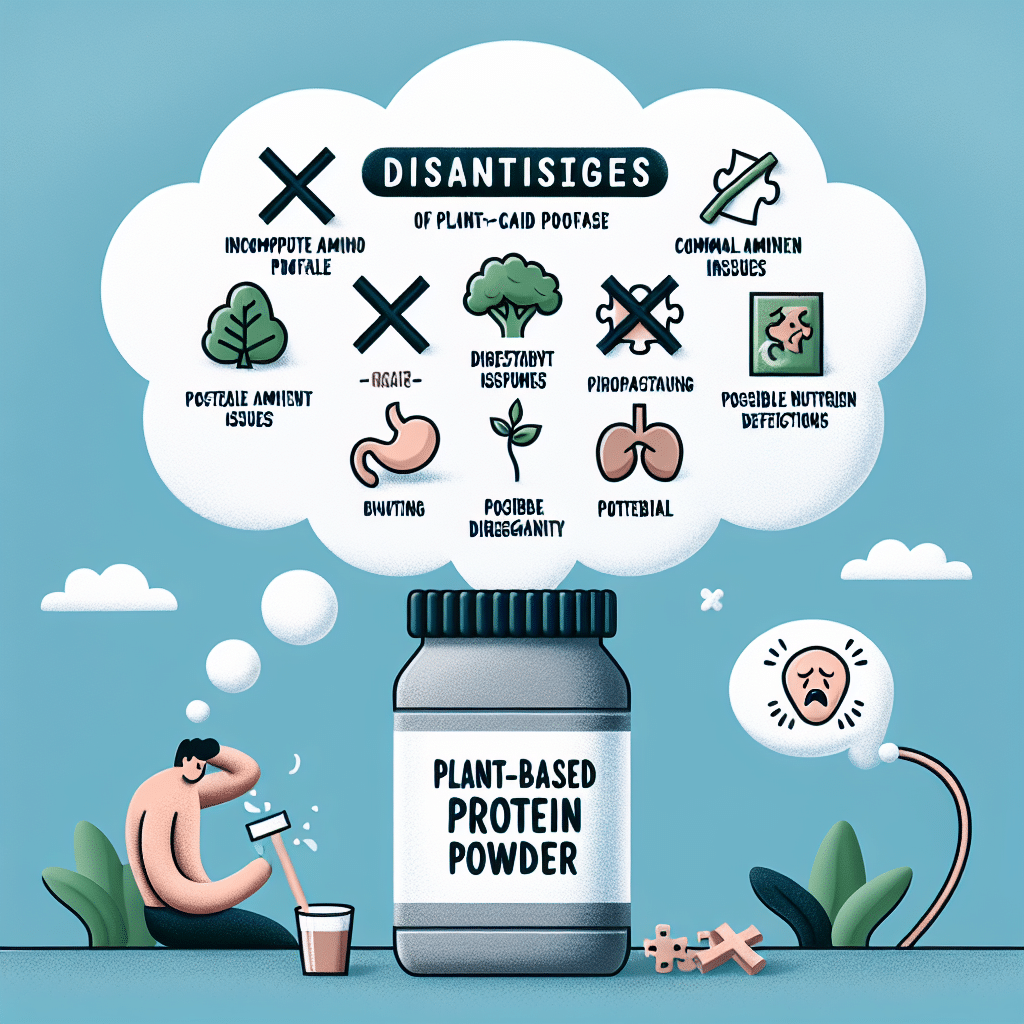What are the disadvantages of plant-based protein powder?
-
Table of Contents
Plant-Based Protein Powder: Understanding the Disadvantages

Plant-based protein powders have surged in popularity as a dietary supplement, especially among those who follow vegan or vegetarian diets. They are praised for being sustainable and a healthier alternative to animal-based proteins. However, despite their benefits, plant-based protein powders come with their own set of disadvantages that consumers should be aware of. This article delves into the potential drawbacks of plant-based protein powders, providing insights and statistics to help you make an informed decision.
Nutritional Incompleteness
One of the primary concerns with plant-based protein powders is their nutritional profile. Unlike animal proteins, which are complete proteins containing all nine essential amino acids, some plant proteins are incomplete. This means they lack one or more of the essential amino acids necessary for protein synthesis in the body.
- For example, rice protein is low in lysine, while pea protein is low in methionine and cysteine.
- Consumers often need to combine different plant proteins to achieve a complete amino acid profile, which can be inconvenient and costly.
Digestibility Issues
Plant-based proteins are sometimes harder for the body to digest compared to their animal counterparts. This is due to the presence of anti-nutrients such as phytates and tannins, which can inhibit the absorption of minerals and affect protein digestibility.
- Individuals with sensitive digestive systems may experience bloating, gas, or discomfort when consuming plant-based protein powders.
- Some plant proteins undergo processing to remove these anti-nutrients, but this can lead to a loss of other beneficial nutrients.
Heavy Metal Contamination
Another concern with plant-based protein powders is the potential for heavy metal contamination. Plants can absorb heavy metals from the soil, which can then concentrate in protein powders.
- A study by the Clean Label Project found that some plant-based protein powders contained concerning levels of heavy metals like lead, arsenic, and cadmium.
- Long-term exposure to heavy metals can lead to health issues, making it crucial for consumers to choose products that have been tested for contaminants.
Flavor and Texture Challenges
The taste and texture of plant-based protein powders can be less appealing to some consumers. They often have a grittier texture and a more earthy flavor than whey or casein proteins.
- Manufacturers may add sweeteners, flavorings, or thickeners to improve the taste and texture, which can increase the calorie content or add unwanted additives to the diet.
- Individuals with specific taste preferences may find it challenging to incorporate plant-based protein powders into their diet.
Cost Considerations
Plant-based protein powders can be more expensive than their animal-based counterparts. The cost of sourcing high-quality, organic plant ingredients and processing them to remove anti-nutrients and contaminants can drive up the price.
- For those on a budget, the higher cost of plant-based protein powders can be a significant disadvantage.
- Consumers may need to balance the benefits of plant-based proteins with their financial constraints.
Environmental Impact
While plant-based proteins are often touted for their lower environmental impact compared to animal proteins, they are not without their own ecological concerns.
- The farming practices for some plant proteins can lead to deforestation, soil degradation, and water use issues.
- It’s essential for consumers to research the sourcing and production methods of plant-based protein powders to ensure they align with sustainable practices.
Conclusion: Weighing the Pros and Cons
In conclusion, while plant-based protein powders offer a range of benefits, they also come with several disadvantages that should not be overlooked. Nutritional incompleteness, digestibility issues, heavy metal contamination, flavor and texture challenges, cost considerations, and environmental impact are all factors that consumers must consider when choosing a protein supplement. By being informed about these drawbacks, individuals can make choices that align with their health goals and dietary preferences.
Discover ETprotein’s High-Quality Plant-Based Proteins
If you’re looking for a reliable source of plant-based protein powders, ETprotein offers a variety of options that address many of the concerns highlighted in this article. Their products are characterized by a neutral taste, non-GMO, allergen-free attributes, and are rigorously tested for purity and quality. With a commitment to sustainability and customer satisfaction, ETprotein is an excellent choice for your protein needs.
About ETprotein:
ETprotein, a reputable protein and L-(+)-Ergothioneine (EGT) Chinese factory manufacturer and supplier, is renowned for producing, stocking, exporting, and delivering the highest quality organic bulk vegan proteins and L-(+)-Ergothioneine. They include Organic rice protein, clear rice protein, pea protein, clear pea protein, watermelon seed protein, pumpkin seed protein, sunflower seed protein, mung bean protein, peanut protein, and L-(+)-Ergothioneine EGT Pharmaceutical grade, L-(+)-Ergothioneine EGT food grade, L-(+)-Ergothioneine EGT cosmetic grade, L-(+)-Ergothioneine EGT reference grade and L-(+)-Ergothioneine EGT standard. Their offerings, characterized by a neutral taste, non-GMO, allergen-free attributes, with L-(+)-Ergothioneine purity over 98%, 99%, cater to a diverse range of industries. They serve nutraceutical, pharmaceutical, cosmeceutical, veterinary, as well as food and beverage finished product distributors, traders, and manufacturers across Europe, USA, Canada, Australia, Thailand, Japan, Korea, Brazil, and Chile, among others.
ETprotein specialization includes exporting and delivering tailor-made protein powder and finished nutritional supplements. Their extensive product range covers sectors like Food and Beverage, Sports Nutrition, Weight Management, Dietary Supplements, Health and Wellness Products, and Infant Formula, ensuring comprehensive solutions to meet all your protein needs.
As a trusted company by leading global food and beverage brands and Fortune 500 companies, ETprotein reinforces China’s reputation in the global arena. For more information or to sample their products, please contact them and email sales(at)ETprotein.com today.












